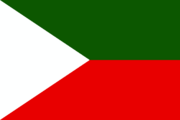Jammu Kashmir Liberation Front facts for kids
Quick facts for kids
Jammu Kashmir Liberation Front
جموں کشمیر آزادی محاذ
|
|
|---|---|
| Abbreviation | JKLF |
| Leader | Yasin Malik |
| Chairman | Farooq Siddiqui |
| Founders | Amanullah Khan Maqbool Bhat |
| Founded | May 29, 1977 Birmingham, United Kingdom |
| Banned | March 22, 2019 (Indian branch in the Kashmir Valley) |
| Split from | Azad Kashmir Plebiscite Front |
| Preceded by | National Liberation Front |
| Headquarters | Muzaffarabad, Azad Jammu and Kashmir, Pakistan |
| Think tank | JKLF Media Cell |
| Student wing | Jammu Kashmir Student Liberation Front (JKSLF) |
| Youth wing | JKLF Youth Wing |
| Women's wing | JKLF Women Wing |
| Ideology | Kashmiri nationalism Separatism |
| Regional affiliation | All Parties Hurriyat Conference |
| Colors | Green Red White |
| Election symbol | |
 Maple Leaf |
|
 |
|
The Jammu Kashmir Liberation Front (JKLF) is a political group that used to have an armed wing. It is active in both the Indian-controlled and Pakistani-controlled parts of Kashmir. The group was started by Amanullah Khan, with Maqbool Bhat also known as a co-founder.
The JKLF officially got its name in Birmingham, England on May 29, 1977. From then until 1994, it was an active group that used fighting methods in Kashmir. The JKLF first set up offices in many cities in the United Kingdom and other countries. These included places in Europe, the United States, and the Middle East. In 1982, it opened an office in the Pakistani-controlled area called Azad Jammu and Kashmir. By 1987, it had an office in the Indian-controlled Kashmir Valley.
After 1994, the JKLF group in Indian-administered Kashmir, led by Yasin Malik, announced a "ceasefire." This meant they would stop fighting. They then decided to work towards their goal using only political methods. Their main goal is for the entire region of the former princely state of Jammu and Kashmir to become independent. This means it would be free from both India and Pakistan.
However, the JKLF group in Azad Jammu and Kashmir did not agree with this change. They separated from the group in the Kashmir Valley. In 2005, the two groups joined together again. They kept the original name and goals of the organization.
Even though the JKLF only has Muslim members, it aims to be a secular group. This means it wants a government that is not based on religion. Its main goal is an independent Kashmir that is free from both India and Pakistan. The JKLF has received support like weapons and training from the Pakistani military. However, it still sees Pakistan as an "occupation power" and works against it politically in Azad Jammu and Kashmir.
The JKLF in the Kashmir Valley was officially banned by the Indian government. This happened in March 2019 under an anti-terror law. This ban came one month after the Pulwama attack by another group called Jaish-e-Mohammed.
Contents
History of JKLF
The JKLF was started by Amanullah Khan in Birmingham in June 1976. It grew out of an earlier group. Maqbool Bhat is also often called a co-founder. Khan was born in Gilgit and later moved to Pakistan. Bhat was born in Kupwara and also moved to Pakistan.
Khan and Bhat had earlier formed another group called the Jammu Kashmir National Liberation Front (NLF) in the late 1960s. In January 1971, this group was involved in an event where an Indian Airlines plane, flying from Srinagar to Jammu, was taken to Lahore. The Pakistani government sent all the passengers and crew back to India. Later, some people involved were put on trial.
Amanullah Khan moved to England. There, he received strong support from the British Mirpuri community. The group in the UK became the Jammu and Kashmir Liberation Front (JKLF) in May 1977. It also formed an armed part called the 'National Liberation Army'. Amanullah Khan became the General Secretary of JKLF. With help from the British Mirpuris, the group grew quickly. It set up branches in Pakistan, Denmark, Holland, Germany, France, Saudi Arabia, United Arab Emirates, and the United States.
In February 1984, members of the National Liberation Army kidnapped an Indian diplomat named Ravindra Mhatre in Birmingham. They demanded the release of Maqbool Bhat. Sadly, the diplomat died. India then executed Maqbool Bhat six days later. This event made Maqbool Bhat a hero for the JKLF and brought the group more attention. A British court found two JKLF members guilty in connection with the diplomat's death.
Kashmir Insurgency and Changes
Amanullah Khan returned to Pakistan in 1984. The JKLF set up its main office in Muzaffarabad. Pakistan, under Zia ul-Haq, was willing to support a movement in Kashmir. Khan was ready to work with Pakistan's intelligence agency, the Inter-Services Intelligence (ISI).
After the 1987 election in Jammu and Kashmir, many young people in the Kashmir Valley felt unhappy. They started crossing the Line of Control to Azad Kashmir to get weapons and training. Khan's JKLF became their main choice. The JKLF in Indian-controlled Kashmir was "reborn" during this time. It was led by young activists from Srinagar. They went to Azad Kashmir for training and then returned to Srinagar.
Yasin Malik, along with Hamid Sheikh, Ashfaq Wani, and Javed Ahmad Mir, formed the main group of JKLF fighters in the Kashmir Valley. They were called the "HAJY" group. The huge support they received for their call for independence surprised them. Within two years, the JKLF in the Valley became a leading group in a popular uprising against the Indian government.
The JKLF fought against the Indian security forces. They were involved in the kidnapping of Rubiya Sayeed, who was the daughter of India's Home Minister. They also attacked government and security officials. In March 1990, Ashfaq Wani was killed in a fight with Indian security forces. In August 1990, Yasin Malik was captured while injured. He was held in prison until May 1994. By 1992, most of the JKLF fighters were either killed or captured.
Pakistan was not interested in an independent JKLF. Pakistan is thought to have worked with JKLF only because other religious groups were not yet popular in the Kashmir Valley. However, members of religious groups were also trained in JKLF camps. This soon changed the JKLF's focus on Kashmiri nationalism. Independence and Islam became mixed together.
Moving Towards Peaceful Methods
By 1992, most JKLF fighters were killed or captured. They were losing ground to pro-Pakistan groups like the Hizb-ul-Mujahideen. These groups were strongly supported by the Pakistani military. Also, more religious fighters from Pakistan entered the Valley, changing the nature of the movement. Pakistan stopped giving money to the JKLF because of its goal for independence.
After being released from prison in May 1994, Yasin Malik announced that the JKLF would stop fighting. This was called an indefinite ceasefire. However, the JKLF still lost many members in operations by Indian forces.
Malik's decision for a peaceful struggle was not accepted by Amanullah Khan. Khan removed Malik as the president of JKLF. In return, Malik removed Khan from his leadership role. This caused the JKLF to split into two groups. The Pakistani government recognized Yasin Malik as the leader of the JKLF, which made the situation even more complicated.
During the Azad Kashmir elections in 1996, the JKLF had more support than other traditional parties. However, it was not allowed to take part in the elections because it wanted independence.
Splits and Coming Together Again
The JKLF split into two parts after the group in Indian-administered Kashmir, led by Yasin Malik, publicly said they would stop violence in 1995. The other group in Pakistani-administered Kashmir, led by Amanullah Khan, refused to stop fighting. This caused the party to split.
Since 1995, Yasin Malik has stopped using violence. He now calls for only peaceful ways to solve the Kashmir issue. Yasin Malik also believes that the Kashmiri Pandits are an important part of Kashmiri society. Kashmiri Pandits are Hindus who left Kashmir after violent attacks. Many now live in refugee camps in Jammu and other Indian cities. Malik has said they have a right to return.
Yasin Malik said, "We want our Kashmiri Pandit mothers, sisters and brothers to come back. It is their land. They have every right to live in it as we do. This is the time that Kashmiri Muslims must play a constructive role so that we can restore the culture for which we are famous all over the world."
In 2002, Amanullah Khan told Reuters that Muslim fighters who were not from Kashmir, but were supported by Pakistan, had harmed his cause. He said, "I've been saying for the last two to three years that (non-Kashmiri militants) are changing the Kashmir freedom struggle into terrorism."
After an attack on the Indian Parliament in December 2001, Amanullah Khan's name was on a list of wanted people that India gave to Pakistan. In January 2002, Amanullah Khan offered to give himself up to Indian authorities. He said he would do this if an "international court issued a verdict against him."
In 2005, India allowed Yasin Malik to visit Pakistan for the first time. Malik and Khan used this chance to meet each other in Pakistan. In June 2005, ten years after they split, Malik and Khan agreed to reunite the JKLF. The JKLF in Pakistan-administered Kashmir is currently led by Sardar Saghir Ahmad.
In December 2005, some senior members of the JKLF left Yasin Malik's group. They formed a new JKLF with Farooq Siddiqi ("Farooq Papa") as its Chairman. Other members like Javed Mir, Salim Nannaji, and Iqbal Gundroo joined him. Later, former fighter Bitta Karate also joined. Recently, Tahir Mir, who used to lead the Students Liberation Front, also left Malik and joined the JKLF led by Farooq Papa. Some people who study Kashmir think that Yasin Malik's changing ideas, like seeking a solution with India after a secret meeting with the Prime Minister of India, caused his senior leaders to leave. Farooq Papa supports the European Union helping to solve the dispute. He has asked EU officials to follow up on a visit by a European parliament group to Kashmir in 2004.
See also
 In Spanish: Frente de Liberación de Jammu y Cachemira para niños
In Spanish: Frente de Liberación de Jammu y Cachemira para niños
- Maulana Masroor Abbas Ansari
- Kashmir conflict
- Kashmir insurgency
 | Victor J. Glover |
 | Yvonne Cagle |
 | Jeanette Epps |
 | Bernard A. Harris Jr. |

